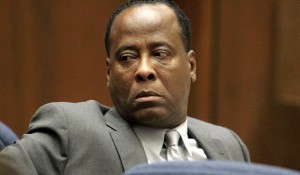
PLEADED NOT GUILTY. Dr. Conrad Murray looks on during his involuntary manslaughter trial in Los Angeles, Thursday, Oct. 20, 2011. Murray has pleaded not guilty and faces four years in prison and the loss of his medical license if convicted of involuntary manslaughter in Michael Jackson's death. (AP Photo/Reed Saxon, Pool)
LOS ANGELES— The lead attorney for the doctor charged in Michael Jackson’s death challenged a key prosecution expert Friday about his contention that the physician was responsible for the death of the singer.
Attorney Ed Chernoff cross-examined Dr. Steven Shafer, who previously testified that the only plausible explanation for the death was that Jackson had been hooked up to an IV drip of the anesthetic propofol then left alone by Dr. Conrad Murray.
“That’s a bold claim, isn’t it,” Chernoff asked.
“It’s an honest statement,” Shafer replied.
Chernoff also questioned the Columbia University researcher and professor about his IV demonstration for jurors on Thursday.
The defense attorney suggested Shafer had drawn conclusions that weren’t necessarily supported by the evidence. Chernoff said the type of IV line that Shafer used in the demonstration was never found at Jackson’s house.
Murray has pleaded not guilty to involuntary manslaughter. He could face up to four years behind bars and the loss of his medical license if convicted.
Shafer was expected to be the last witness called by the prosecution. After Shafer’s testimony ends, defense attorneys will begin presenting their case.
Shafer, an expert on propofol, told jurors Thursday that his explanation was supported by items found in Jackson’s bedroom, the singer’s autopsy results and Murray’s lengthy statement to police.
Using charts and his own experience, Shafer said Jackson likely stopped breathing because of the propofol and without someone to clear his airway. The propofol would have kept dripping into the IV tube, with gravity carrying it into the singer’s body, he said.
Shafer said Murray committed 17 violations of the standard of care that could have led to Jackson’s serious injury or death.
He rejected any theory that Jackson could have given himself the fatal dose of the anesthetic or sedatives.
___
AP Special Correspondent Linda Deutsch contributed to this report.

